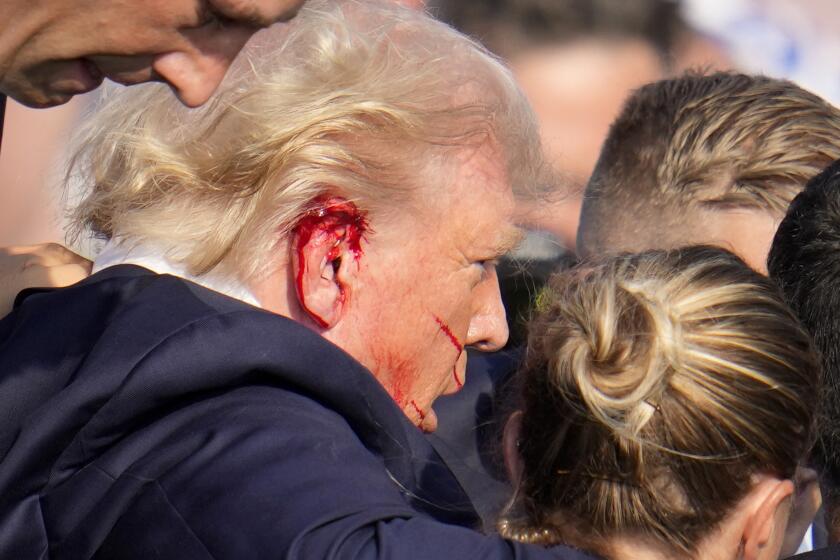Tobacco Firms Smuggled Into Iraq, EU Says
Tobacco companies have violated a U.S. trade embargo for more than a decade by illegally sending billions of cigarettes into Iraq, the European Union has charged.
The allegation is detailed in documents recently filed in federal court in Brooklyn, where the European Union has accused tobacco firms of evading hundreds of millions of dollars in taxes by taking part in a vast cigarette smuggling scheme.
The Iraq charge focuses on two companies, R.J. Reynolds and Japan Tobacco Inc., which acquired Reynolds’ international cigarette business in 1999. But an affidavit filed in court also claims that in December a witness saw Philip Morris brands being trucked from Turkey into Iraq.
U.S. trade with Iraq was outlawed in August 1990 after Iraq’s invasion of Kuwait. The embargo covers not only direct shipments but also transshipments of goods through third countries, according to the Office of Foreign Assets Control, a branch of the Treasury Department. Violations carry stiff criminal and civil penalties.
It could not immediately be determined whether U.S. authorities are looking into the EU’s claims.
A federal grand jury in North Carolina has been investigating whether R.J. Reynolds was involved in European smuggling activities. Peter Kellen, an assistant U.S. attorney in Raleigh, said the investigation is “still pending.”
Kellen would not say whether the Iraq allegations are part of the probe. A Treasury spokeswoman also declined to comment.
Seth Moskowitz, a spokesman for R.J. Reynolds Tobacco Co., denied that the firm “has been involved in smuggling activity in Europe or elsewhere,” calling the allegations “unsupportable and untrue.” Officials with Japan Tobacco could not be reached for comment.
The Iraqi charge was laid out this month in hundreds of pages of pleadings and exhibits in a last-ditch attempt to keep the EU suit from being thrown out. But last week, U.S. District Judge Nicholas G. Garaufis dismissed the case and a similar anti-smuggling case filed by 22 Colombian states.
Garaufis did not address the Iraq allegation in a ruling narrowly based on the “revenue rule,” a common-law doctrine that prevents U.S. courts from being used to collect foreign taxes. However, the judge said the EU and the Colombian states may refile some claims, including money laundering.
The EU charged that despite trade sanctions, Reynolds throughout the 1990s had knowingly sent billions of its cigarettes into Iraq through intermediaries. The cigarettes allegedly traveled from a Reynolds plant in Puerto Rico to European ports and then were re-routed through Cyprus to Turkey to be trucked over the border into Iraq. According to court papers, Japan Tobacco took over the trade when it acquired Reynolds’ international business in 1999.
In support of the charge, the EU filed an affidavit by Tugrul Ozsengul, a Turkish security consultant who said he witnessed the shipments on a visit to the border region in December.
“I went to the Habur border gate of Turkey with Iraq, and I witnessed that Winston cigarettes [sold overseas by Japan Tobacco] and Philip Morris brand cigarettes were being shipped across the border into Iraq,” Ozsengul said. “I questioned people working and living in the area about these shipments and learned that almost every day lorries, mainly of the above-mentioned brands, have been shipped to Iraq, and this situation has persisted for several years.”
Lawyers for the EU also filed a copy of a suit by an Iranian businessman who accused Reynolds and a Cypriot tobacco distributor of reneging on an agreement to give him the exclusive right to supply the Iraqi market.
In the 1997 lawsuit, filed in Limassol, Cyprus, Abdel Hamid Damirji said he began sending Reynolds brands into Iraq from Amman, Jordan, about 1990. Damirji said that routing became impossible, and that with Reynolds’ approval he spent nearly $1 million to build and equip two warehouses in Turkey to continue the Iraqi trade.
But though Damirji was to be the “sole and exclusive supplier” of cigarettes to Iraq, in the mid-1990s Reynolds and a Cypriot distributor, IBCS Trading, began diverting part of the Iraqi business to two other wholesalers, Damirji claimed.
In response, IBCS acknowledged being a distributor for Reynolds but denied violating a contract with Damirji. Reynolds’ response and the resolution of the suit could not be determined.
EU lawyers also claimed that a portion of the proceeds from the Iraqi shipments may have aided terrorists. They described a document filed under seal as showing that the Kurdistan Workers’ Party, classified by the U.S. as a terrorist group, was linked to the cigarette trade. They also cited widely publicized claims by a Iraqi defector that Uday Hussein, son of Iraq’s ruler, Saddam Hussein, controls illicit trade in cigarettes and other goods.
In response, tobacco lawyers accused the EU of trying “to pollute these proceedings” with “bizarre” submissions and “hyperbolic rhetoric.”
Invoking terrorism was an attempt by the EU to give the judge a reason not to decide the case on the revenue rule.
Last fall, the 2nd Circuit Court of Appeals, which sits above Garaufis, found that the rule does apply to such cases. In its ruling, the 2nd Circuit upheld the dismissal of Canada’s $1-billion smuggling suit against Reynolds.
In 1998, a Reynolds subsidiary, Northern Brands Inc., paid $15million and pleaded guilty to U.S. charges stemming from cigarette smuggling. The case involved Canadian cigarettes exported duty-free into upstate New York and then smuggled back to Canada.
More to Read
Sign up for Essential California
The most important California stories and recommendations in your inbox every morning.
You may occasionally receive promotional content from the Los Angeles Times.





